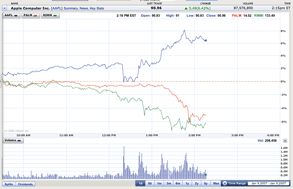Zink unveils mobile full-color thermopaper printer
The Polaroid spin-off Zink just unveiled a new full-color thermal-paper printer based on technology from Polaroid’s Project Opal. From the SJ Mercury News:
Zink prints a 2-by-3-inch picture in 30 seconds — somewhat slower than inkjet printers — that comes out dry. It brings back the instant gratification of 1970s-era Polaroid picture, without forcing you to wait for it to develop. And it’s a much better quality print than Polaroids were.
With Zink devices, the plastic paper has layers of plastic in the middle with millions of tiny crystal dyes that can be activated by heat. If you heat the paper a certain amount, the dyes melt and you get yellow. If you heat it less but for a slightly longer time, you get magenta. If you heat it a little less and slightly longer, you get cyan. Those colors can be mixed to print any color. If you think of microwaving a frozen dinner, you get the idea.
The special paper is still a little expensive (about 80 cents for a 4-by-6-inch print) because it has to be doped with ink over the entire surface, but the company hopes to reduce the cost in the future.
Zink unveils mobile full-color thermopaper printer Read More »


